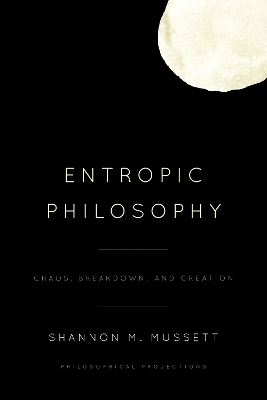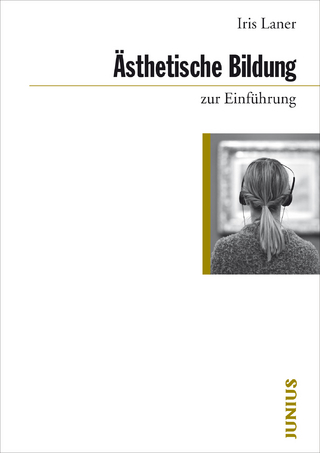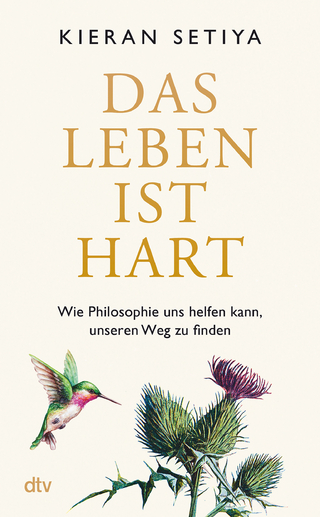
Entropic Philosophy
Chaos, Breakdown, and Creation
Seiten
2022
Rowman & Littlefield International (Verlag)
978-1-78661-246-5 (ISBN)
Rowman & Littlefield International (Verlag)
978-1-78661-246-5 (ISBN)
Taking an interdisciplinary approach, this book traces the development of entropic themes, capturing phenomena ranging from chaos, disorder, homogenization, slackening, disspation, and ultimately death.
Now is a time of tremendous anxiety about the present and future state of the world. The second law of thermodynamics states that entropy never decreases, that time marches relentlessly forward, and that systems and energy inevitably break down. Entropy thus serves as a powerful metaphor capturing expressions of growing malaise, chaotic breakdown, and death.
Taking an interdisciplinary approach, Entropic Philosophy: Chaos, Breakdown, and Creation, traces the development of entropic themes in philosophy, anthropology, psychoanalysis, literature, and art. It also provides tools for rethinking how to confront the urgency of the now. Entropic thinking gives voice to novel phenomena born of collapse and dissolution. Originally describing the loss of energy available for work, entropy blossoms into an umbrella concept capturing phenomena ranging from chaos, disorder, homogenization, slackening, dissipation, and ultimately, death. However, “entropy” comes from the Greek, entropia, meaning “a turning toward” or “transformation.” Thus, what from one perspective induces anxiety, fear, or resignation, from another opens new ways of thinking and being that are crucial in preventing existential inertia and despair.
Now is a time of tremendous anxiety about the present and future state of the world. The second law of thermodynamics states that entropy never decreases, that time marches relentlessly forward, and that systems and energy inevitably break down. Entropy thus serves as a powerful metaphor capturing expressions of growing malaise, chaotic breakdown, and death.
Taking an interdisciplinary approach, Entropic Philosophy: Chaos, Breakdown, and Creation, traces the development of entropic themes in philosophy, anthropology, psychoanalysis, literature, and art. It also provides tools for rethinking how to confront the urgency of the now. Entropic thinking gives voice to novel phenomena born of collapse and dissolution. Originally describing the loss of energy available for work, entropy blossoms into an umbrella concept capturing phenomena ranging from chaos, disorder, homogenization, slackening, dissipation, and ultimately, death. However, “entropy” comes from the Greek, entropia, meaning “a turning toward” or “transformation.” Thus, what from one perspective induces anxiety, fear, or resignation, from another opens new ways of thinking and being that are crucial in preventing existential inertia and despair.
Shannon Mussett is Professor of Philosophy at Utah Valley University
1. Privation and Disorder: Entropy in Greek Thought / 2. Decay and Breakdown in Nature: Kant and Hegel on Organic Purposiveness and Death / 3. Leveling the Modern Epoch: The Freudian Death Drive and Lévi-Straussean Entropics / 4. Entropic Denial: How the Aged and Exploited Bear the Burden of Late Capitalism/ 5. Entropic Places and Peoples / 6. In Praise of Destruction: Nietzsche and Smithson on the Eternal Joy of Becoming / Bibliography / Index
| Erscheinungsdatum | 17.08.2020 |
|---|---|
| Verlagsort | London |
| Sprache | englisch |
| Maße | 160 x 228 mm |
| Gewicht | 513 g |
| Themenwelt | Geisteswissenschaften ► Philosophie |
| Sozialwissenschaften | |
| ISBN-10 | 1-78661-246-1 / 1786612461 |
| ISBN-13 | 978-1-78661-246-5 / 9781786612465 |
| Zustand | Neuware |
| Haben Sie eine Frage zum Produkt? |
Mehr entdecken
aus dem Bereich
aus dem Bereich
wie Philosophie uns helfen kann, unseren Weg zu finden
Buch | Hardcover (2023)
dtv Verlagsgesellschaft
26,00 €
wie Hoffnung politisch wird
Buch | Softcover (2023)
Philipp Reclam (Verlag)
7,00 €


